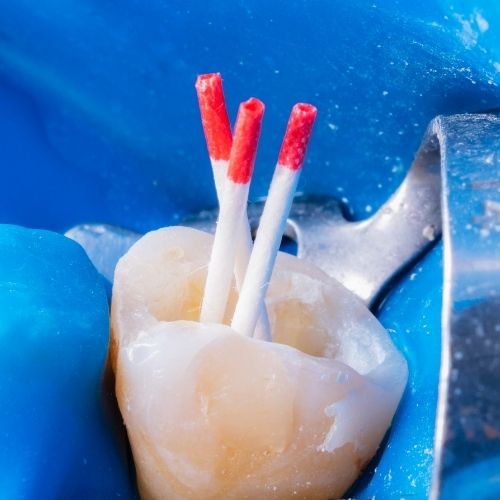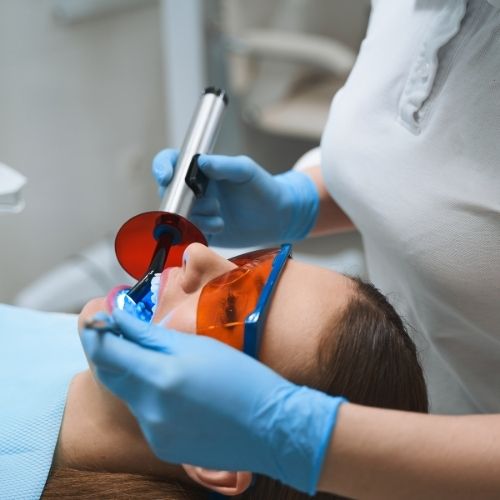Root Canal Hartwood, VA
Root canal is one of the most common dental procedures. Root canal therapy is used to treat problems that involve tooth’s pulp or tooth nerve. The tooth appears to be a hard, solid material from the outside.
Root Canal Symptom
When you have tooth decay and cavities that are not treated in the start, it could lead to further damage. If the pulp tissue or nerve inside the tooth may become inflamed or infected. In such a case a root canal remains the only option. Tooth decay that progresses down into the tooth permits harmful bacteria to access the soft tissue is the most common reason. Trauma or an unintentional blow to the teeth, multiple fillings over the years, or a broken down tooth in need of a crown are some of the other explanations. All of these factors have the potential to inflame or infect the pulp. An infected and open nerve could be the cause of severe dental pain. Sensitivity to heat and cold, soreness, tooth discolouration, and swelling and tenderness in the surrounding area and lymph nodes are all possible symptoms. It’s critical to contact a dentist as soon as possible if you’re having tooth discomfort. Inflammation and infection near the end of the tooth might extend into the surrounding bone and cause TMJ issues. It’s possible that the tooth and surrounding area will become extremely painful, and that swelling will develop. To save the tooth, a root canal operation must be performed after this occurs. The tooth must be extracted as the sole option. Root canal can save you a lot of trouble and relieve you from a lot of pain.
Root Canal Treatment
The treatment involves first a check up to determine what course of action should be taken. An x-ray is taken to see the extent of infection. They might numb the area with anesthesia. A hole drilled to access the gum through the top of the tooth. An infected tissue is then removed and the inside is cleaned with appropriate solution. Most of the time the doctor will wait a few days before root canal filling. In time they might put medicine to stop the infection and get rid of the bacteria.A filling which is mainly made of rubber compound called Gutta Percha is filled into the hole created. If the teeth damage was extensive tooth restoration, crown and other dental procedures usually follow. For a few hours after a root canal, your mouth will be numb. Most people can return to work, school, or other activities immediately. Before eating, you might wish to wait until the numbness is gone. The tooth may feel sensitive for the first few days after a root canal because of tissue inflammation, especially if there was discomfort or infection prior to the operation. Over-the-counter pain relievers such as ibuprofen (Advil, Motrin) or naproxen can usually help (Aleve). Brush, floss, and use an antiseptic mouthwash as usual, and visit your dentist at your regular intervals.
Root Canal Treatment
The treatment involves first a check up to determine what course of action should be taken. An x-ray is taken to see the extent of infection. They might numb the area with anesthesia. A hole drilled to access the gum through the top of the tooth. An infected tissue is then removed and the inside is cleaned with appropriate solution. Most of the time the doctor will wait a few days before root canal filling. In time they might put medicine to stop the infection and get rid of the bacteria.A filling which is mainly made of rubber compound called Gutta Percha is filled into the hole created. If the teeth damage was extensive tooth restoration, crown and other dental procedures usually follow. For a few hours after a root canal, your mouth will be numb. Most people can return to work, school, or other activities immediately. Before eating, you might wish to wait until the numbness is gone. The tooth may feel sensitive for the first few days after a root canal because of tissue inflammation, especially if there was discomfort or infection prior to the operation. Over-the-counter pain relievers such as ibuprofen (Advil, Motrin) or naproxen can usually help (Aleve). Brush, floss, and use an antiseptic mouthwash as usual, and visit your dentist at your regular intervals.
Crown
Root canal operations are used to treat teeth that are diseased or have rotting pulp and require immediate drilling and cleaning from the inside. Following an intrusive procedure such as a root canal, the integrity of your tooth is either destroyed or significantly compromised, necessitating teeth strengthening. Following a root canal, a dental crown reinforces your tooth and restores its health and usefulness. Although a dental crown is not required after every root canal operation, tooth reinforcement is required after all root canal surgeries. Because of tooth-drilling, cavities, or infection, a tooth can become more fragile after root canal treatment. This tooth can be protected and made long-lasting with the help of a strong dental crown. Some existing nerves may become more sensitive to heat and cold after root canal therapy, which can be very unpleasant. Another reason for the requirement for a dental crown following a root canal operation is to safeguard the tooth. After a root canal, the colour of certain teeth changes. A dental crown can give a tooth a more natural appearance and a whiter hue to match the rest of the teeth if it is greyed or heavily discoloured.
Dental Filling
If you don’t have a filling at the first sign of cavities, you may need to root canal later on. Root canals are more expensive, but it also takes longer to instal and is not as straightforward as a regular filling. All of this can be avoided by obtaining a filling as soon as a cavity appears. Your filling can also be designed to match your teeth, allowing you to keep your ideal smile. Minor fillings can last a long time, and the advantages of maintaining a clean, healthy mouth outweigh the cost of one small filling.
Dental Surgery
We perform almost all kinds of dental surgeries. They include root canal, dental implants, tooth extraction(wisdom and medical), reconstructive, TMJ and cosmetic surgeries. A medical dental surgeon can perform the needed dental surgeries safely. We work with some of the most skilled professionals in the field.
Teeth Extractions
When your dentist is unable to save a tooth, it must be extracted. This could be the situation if you have a significant cavity that has compromised too much of the structure of your tooth, leaving it too weak to heal. Extraction may also be the best option if your tooth has a significant fracture. A tooth that has a break that extends below the gumline is a good candidate for extraction. If the tooth must be pulled, your dentist will numb the area first so you don’t feel any pain during the process. They’ll next use an elevator, a lever-like device, to dislodge your tooth while it’s still in its socket. After that, forceps will be used to extract the tooth. While this is going on, you should anticipate to feel some pressure, but nothing that will make you uncomfortable.
Book An Appointment Now !
Book Your Appointment Now !
The crown of a tooth is the visible area of the tooth that is utilised to chew food. The root of the tooth is the component of the tooth that is embedded in the bone beneath the gum line. It anchors the tooth in the bone socket and is about twice as lengthy as the crown. The pulp tissue is found within the hollow structure of the tooth’s root. Nerves, blood arteries, and connective tissue make up this soft tissue. When the pulp tissue becomes inflamed or infected, root canal therapy or endodontic treatment is required. It entails removing the injured pulp tissue and replacing it with gutta percha, an inert substance. At Priority Dentistry, we have skilled professionals who will make getting a root canal easy and affordable. Our aim is to give you painless dental work that improves your life and makes you confident.
Your dentist will offer the most effective treatment technique based on their expert judgement after inspecting your diseased or damaged tooth. Discuss any reservations you have about your dentist’s recommendation with him or her.
Address
4860 Hurry Street
Hartwood, VA 22471, USA
Phone
(540) 286-3629
Working Hours
Everyday 7am - 7pm


